#Don Rumata
Explore tagged Tumblr posts
Text


I have a type,
and it's gods that cry themselves to sleep every night because of their paralyzing sense of powerlessness.
#here's to me trying to draw more than last year *clink*🥂 first art of the year#here's also to my art getting hornier with each passing year *clink*🥂#tears and no tears variant cuz I liked the one without them also#don rumata#hard to be a god#strugatsky brothers#my fan art
44 notes
·
View notes
Text
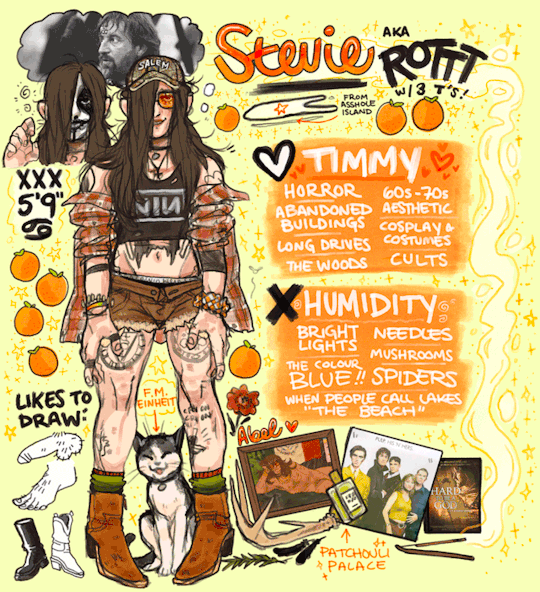
aboot the artist 🧡🍊
48 notes
·
View notes
Text

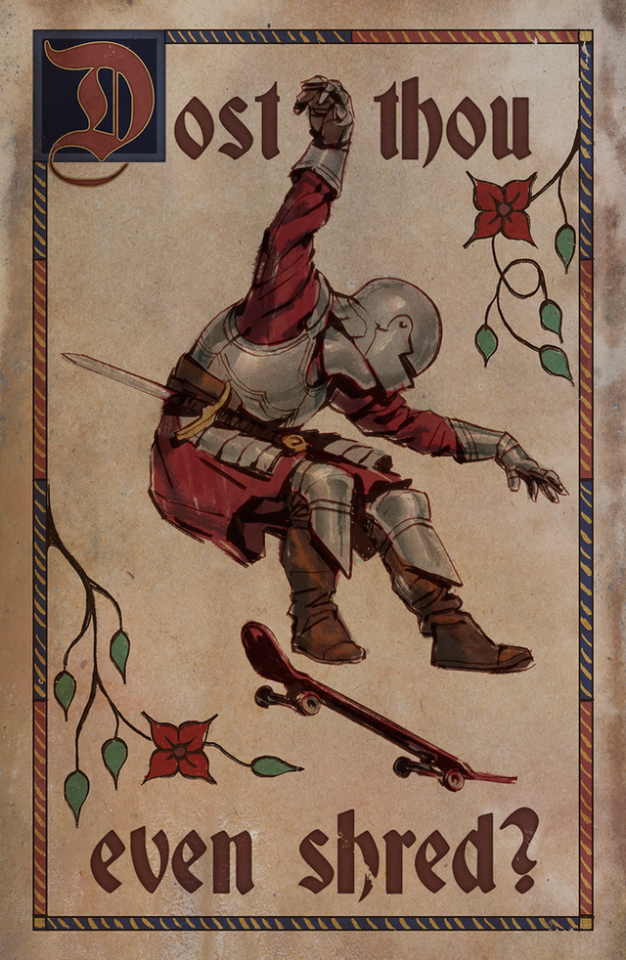
makkon
#!!!#LOVE THIS#Don ''Dost Thou Even Shred?'' Rumata!#my favourite vidya gaem Don Rumata's Pro Skater!#ALSO GABE WAIT A SECOND SLOW DOWN#HOLD THE PHONE#ANTON IS ON ANOTHER BOOK?!?! EA-ANTON IS THE SAME AS HTBAG-ANTON?!??!!?!?!?#art#razielim#Hard to Be a God#Don Rumata
49K notes
·
View notes
Text
Hard to be a god

Title: Hard to Be a God Author: Arkady and Boris Strugatsky
Genre: Sci-fi/medival
Overall rating : ⭐⭐⭐⭐
"Hard to Be a God" is a masterpiece of science fiction that plunges readers into a world both familiar and utterly alien. Penned by the renowned Strugatsky brothers, Arkady and Boris, this novel challenges perceptions, probes the depths of human nature, and creates a vividly immersive experience that lingers long after the final page.
Set on the planet Arkanar, which resembles Earth in the midst of its medieval period, the story follows Anton, an observer from a highly advanced civilization sent to study and guide the less developed society. Disguised as Don Rumata, a nobleman, Anton navigates the brutal and chaotic world of Arkanar, torn apart by ignorance, violence, and superstition.
What makes "Hard to Be a God" exceptional is its exploration of cultural relativism and moral ambiguity. As Anton struggles to fulfill his mission without intervening directly in Arkanar's affairs, he grapples with the ethical dilemmas inherent in his role. The Strugatsky brothers deftly depict the clash between progress and stagnation, civilization and barbarism, leaving readers questioning the nature of progress and the responsibilities of those with knowledge and power.
The novel is richly atmospheric, immersing readers in the grimy streets, dank taverns, and oppressive castles of Arkanar. The Strugatskys' skillful world-building breathes life into this harsh and unforgiving landscape, populated by vivid characters whose motivations and actions drive the narrative forward.
Moreover, "Hard to Be a God" is not merely a tale of otherworldly adventure; it is a profound meditation on the human condition. Through Anton's experiences, the novel explores themes of identity, empathy, and the relentless march of history. As Anton witnesses the suffering and cruelty around him, he grapples with his own humanity and the limitations of his role as an observer.
In conclusion, "Hard to Be a God" stands as a towering achievement in the realm of science fiction literature. With its thought-provoking narrative, intricate world-building, and philosophical depth, it transcends the genre to offer a timeless exploration of the human condition. Whether you're a fan of speculative fiction or simply crave a compelling and intellectually stimulating read, this novel is not to be missed.
This is not a book I would recommend if you are not familiar with Russian books, it is not an easy read. It is a type of book that is written with the idea that you already know what is happening.
Overall, I'd give it 4/5 stars
#book review#bookworm#reading#reading community#bookblr#bookish#russian literature#strugatsky brothers#hard to be a god
6 notes
·
View notes
Text
So, some scattered and more serious thoughts on Hard To Be A God: (I am aware that there are other books set in the same universe, but am taking this as a stand-alone work for now)
-The rank-and-file Gray soldiers are associated with the shopkeeper class over and over, which matches the real-world history of fascist sympathies among the petit-bourgeoisie, but also reflects the nobles brushing off their own complicity in this
-We see very little of Earth, and have no idea if this communist utopia is truly all it’s cracked up to be, or how much of the world it spans, or if they have any track record of successfully improving other planets; but we do know is that their model of history is overdetermined enough to be helpless against things like fascism appearing “ahead of schedule,” so it comes off to me as a critique of an orthodox Marxist view of historical cycles
-Don Rumata compares the Grays to Nazis a few times, but never to Stalinists, and the Doylist part of me gets that the Strugatskys couldn’t have done that at the time, but in-universe it also feels like he’s willfully neglecting something very relevant in the history of his own culture specifically
-…However, while this novel is very clearly the product of growing up under Stalinism, reading it as exclusively about that feels like missing the point and stifling it; like Darkness at Noon, the absence of the word “Stalin” reminds you that these dynamics are not unique to his regime
-I need to reread The Left Hand of Darkness and put these books in conversation
4 notes
·
View notes
Text
YESSSSSSSS THAT RIGHT THERE!
LOVE IT SO MUCH
The -Hard To Be a God- Experience to a tee!!!!!
I’ve been here for fifteen years. My dear boy, I’ve even stopped having dreams about Earth. One day, rummaging through my papers, I found a picture of a woman and for a long time couldn’t figure out who she was. I occasionally realize with terror that I’ve long stopped being an employee of the Institute, that I’m now an exhibit in the Institute’s museum, the chief justice of a feudal mercantile republic, and that there’s a room in the museum in which I belong. That’s the worst thing—to lose yourself in the role. Inside each one of us, the noble bastard struggles with the communard. And everything around us helps the bastard, while the communard is all alone—the Earth is thousands and thousands of parsecs away.” Don Condor paused, stroking his knees. “That’s how it is, Anton,” he said in a firmer voice. “We must remain communards.”
(...)
A wave of fury and repulsive, obscene joy at being free from everything human had already gotten hold of him. He was still an earthling, an operative, an heir to the people of fire and iron, who didn’t spare himself or others in the name of a great purpose. He couldn’t become Rumata of Estor, flesh of the flesh of twenty generations of warlike ancestors, renowned for their pillaging and drunkenness. But he was no longer a communard. He no longer had responsibilities to the Experiment. He was only concerned with his responsibilities to himself. He no longer had any doubts. He was certain of everything, absolutely everything. He knew exactly whose fault everything was, and he knew exactly what he wanted: to hack them to pieces, set them on fire, hurl them down from the palace steps onto the spears and pitchforks of a roaring crowd.
More random tropes that I fucking love: Becoming the mask you wore.
Like oh shit, this character who was sent to spy somewhere under a false identity suddenly realises they've started to genuinely become the person they claimed to be? Someone who's been telling the same lies about who they are for so long that they're actually forgetting that the story isn't true? Finding themselves genuinely doing the things they pretend to do in front of people, when they're alone and nobody's watching? Answering to a name that wasn't supposed to be theirs without thinking?
Ooohh-hoh-hoh, you lost track of yourself in pretending to be someone else? You were only supposed to impersonate somebody, a plausible background and a name you came up with on the spot, and now that the people you were supposed to infiltrate have become your true companions? You lost yourself in the game you played, and no you no longer know who you truly are, and where your true loyalties lie? And both sides would mark you a traitor if you came out with the truth. On a scale of one to ten, how bad did you fuck up.
Fuck that is a good trope. Never seen it done badly. Pour that shit on a table and I'll chop it into lines and snort it.
46K notes
·
View notes
Text
Rumata all but leapt from the horse as its hooves ground into the loose gravel. Both monks stationed either side of the gate ran toward him, deceptively frail arms waving in their oversized tunics.
Rumata pushed some stray hairs from his face and gripped the hilt of his sword firmly before raising his wrist. four silver bracelets shone in the firelight.
“Boy if you don’t get the fuck outta my way you’re going to find out just in whose name it really is!”
“In His name!” the pair replied before backing away and returning to the wall.
Just as quickly as he had arrived, Don Rumata disappeared in the keep grounds.
“Sheeeeeeeesh!” one monk proclaimed with a screech, pushing fingers into his forearm.
“Bet.” replied the other.
6 notes
·
View notes
Text

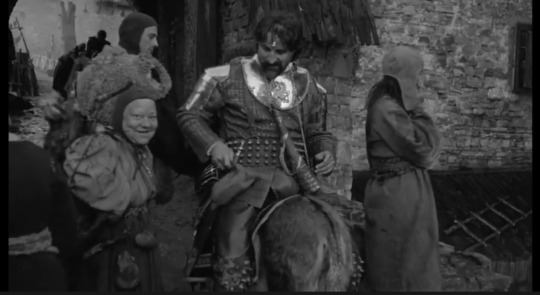


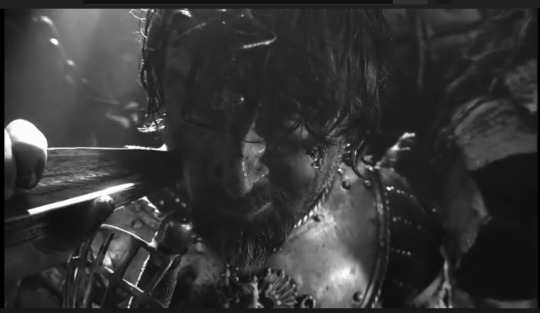
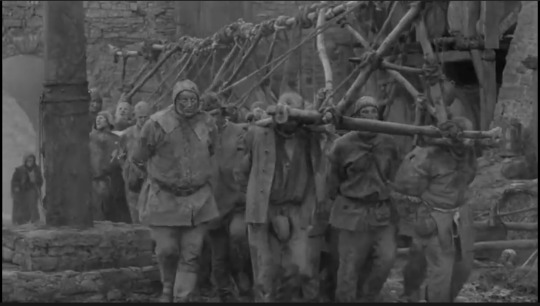


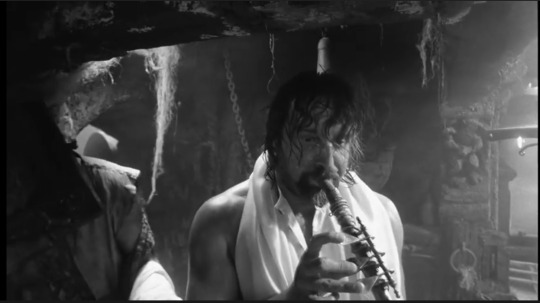

Hard to be a God (2013)
Film review #480
Director: Aleksei German
SYNOPSIS: On another planet, the civilisation there is undergoing a period of time similar to the Earth's Middle Ages. However, this civilisation has not undergone a Renaissance period, and those intellectuals, scholars and artists that would bring it about are mercilessly hunted down by the Order, who rule over the people. A group of Earth's scientists are sent to the city of Arkanar on the planet to observe how this civilisation develops, with orders to not interfere with the society and to keep their mission secret.
THOUGHTS/ANALYSIS: Hard to be a God is a 2013 Russian sci-fi epic, based on the 1964 novel of the same name. The film centres around the city of Arkanar on an alien planet, where a Middle Ages civilisation is diverging from Earth's history, and any attempts at a Renaissance-era is being snuffed out by the ruling Order, which is arresting scholars, intellectuals and artists that may bring this new era about. A group of scientists from Earth are sent to observe this society with orders not to interfere or kill anyone (very Star Trek prime directive, although the original novel came out a year or two before the original TV series). One scientist has taken the guise of Don Rumata, who claims to be the son of a local God, and smuggles the intellectuals that the Order are hunting safely out of the city. The story of the film is...a bit difficult to follow, but at the same time, there isn't too much to follow. There's the elements of the Earth scientists, which doesn't really influence the plot; partly by design, as they are not allowed to interfere. Also the setting of the medieval town itself does not lend itself to a cohesive narrative, with swathes of people just trying to survive amid the filth and fear they are living through, gives the film little direction. This again, however, is by design, as the film really hinges on being able to portray the mess of medieval society, unguided by the scholars and artists. The film definitely echoes the old Soviet Union epics, particularly Tarkovsky's Andrei Rublev, also filmed in black and white. At nearly three hours, it is definitely an endurance piece, and without that direction that a definite story would typically give a film, the viewer becomes increasingly pulled into the mire of this society, which is obviously the film's objective. It's definitely not for everyone, but the film clearly has a very specific ambition and vision, and for the most part, it fulfils said vision with notice effort being poured into all aspects of it.
What makes this film stand out is how the setting is brought to life: this medieval city is absolutely covered in filth and dirt: the people wade through mud everywhere they go, their faces smeared with dirt and blood, and an absurd amount of corpses and entrails hang from the ceilings and adorn the sides of the pathways. Every shot feels like it is considered and thought through: the shot is often obscured with detritus, or extras moving across the camera, constantly giving the impression of everything being claustrophobic, and it being impossible to avoid the filth of the film. Most scenes are long single takes, which must have taken considerable effort to pull off, especially considering the aforementioned amount of extras and objects the camera moves through. The only critique I would say in this respect is that sometimes the camera moves awkwardly through the scenes, but again, given how much is going on, it's a technical achievement that this only happens very rarely. The film isn't particularly gory, but instead focuses on this dirt and unhygienic conditions that immerse the viewer as any everyday occurrence, rather than moments of shock and violence. There are a few particularly gory parts, such as when we see someone's eye ripped out (from behind their head anyway), and an open chest with a still beating heart in it, but these are few and far between: the choice of the film being black and white also somewhat mutes the gore, but in these particular scenes, it becomes incredibly visceral, even without the colour.
As mentioned, the story is almost lost amidst the immersion of the visuals: there's so much going on visually and viscerally that following what the characters are saying and doing is very much a secondary concern. There's no traditional sci-fi metaphor or influence either, other than we are told these scientists came from Earth on an observation mission. I suppose elaborating on these elements would detract from the vision of the film becoming immersed in this society. Reviews on this film typically praise the vision and ambition of the film's production, but is much more divisive with regards to how it tells its story, and also how it portrays the Middle Ages; which certainly wasn't devoid of scholars, art and beauty, but also definitely wasn't the easiest of time to live through. I would generally agree with the consensus: that Hard to be a God is a film that aims to immerse its viewers into a dark, filthy and harsh world, and succeeds in doing so. Whether that is enough to immerse all viewers with a minimal story that is difficult to follow sometimes is another matter, but I think it succeeds in doing what it set out to do. If you like your epic art films, you'll get something out of it; if you don't, you might not last the whole three hours.
4 notes
·
View notes
Photo


Don Rumata opens a door and an owl flies out, he does not react.
The massacre of Arkanar is about to begin.
#hard to be a god#russian film#sci fi#science fiction#aleksei german#heronimous bosche#hobbes#leviathan
35 notes
·
View notes
Text
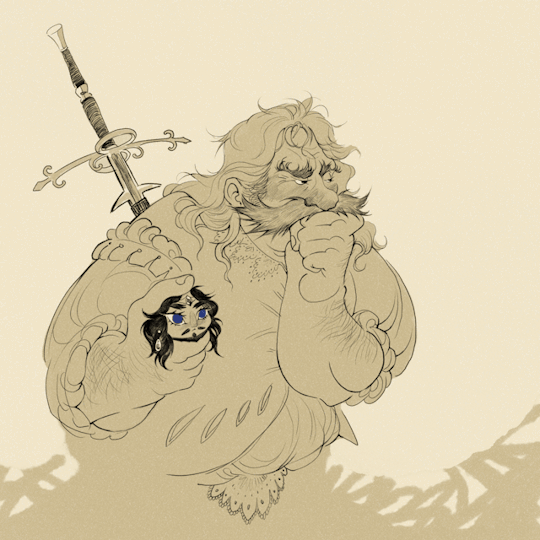
A Baron thinking hard and his emotional support pet space god/ squishy stress ball. This was all @dongtopus' fault idea.
#that's their actual size difference in my head now#marc antony/pussyfoot meme was too perfect for them I had to draw it#Baron Pampa#Don Rumata#Hard to Be a God#Strugatsky Brothers#my fan art
35 notes
·
View notes
Text

i need to get a better picture of him but
2 notes
·
View notes
Text
Hard to be a God (2013)

Directed by Aleksei German
Written by Aleksei German and Svetlana Karmalita
Based on the novel ‘Hard to be a God’ by Arkady and Boris Strugatsky
Music by Viktor Lebedev
Country: Russia, Czech Republic
Language: Russian
Running Time: 177 minutes
CAST
Leonid Yarmolnik as Don Rumata
Dmitri Vladimirov
Laura Pitskhelauri
Aleksandr Ilyin as Arata
Yuri Tsurilo as Don Pampa
Yevgeni Gerchakov as Budakh
Aleksandr Chutko as Don Reba
Oleg Botin as Bucher

At the risk of being excessively humdrum it is important to note that Hard to be a God rumbles on in surly, monochrome magnificence for nigh on 3 hours. If you choose to watch it it’s best to factor that in; Hard to be a God is best enjoyed when you can immerse yourself in its outlandish milieu of brutality and filth. Hard to be a God is science fiction, but be warned it isn’t a love story set on a spaceship or a billion dollar toy advert, so maybe factor that in too. Hard to be a God is a thoroughly truculent mind-trip which is wholly oblivious to your comfort or expectations. Hard to be a God is what’s happening in the arse end of the universe far, far away from where all the nice, happy science fiction movies happen. Hard to be a God is opaque, baffling, grotesque, deranged and wholly, insanely, magnificent.

Hard to be a God is the tale of one Don Rumata (Leonid Yarmolnik) who is introduced to us as a slob of slobs with a penchant for discordant jazz-flute, who dwells in a castle mired in filth and boiling with scrofulous wretches. It turns out that Don Rumata is in fact the very model of hygiene and cleanliness in comparison to the other fetid inhabitants of this repugnant unnamed planet. It is an earth-like planet, wherever it is, and the society infesting its surface is akin to the Middle Ages. It is not unlike the world of Terry Gilliam’s Jabberwocky (1977), but worse because it’s serious and they like it like that. Unfortunately it has been the Middle Ages for some several hundreds of years and is set to remain so for the foreseeable future, as at some point it was decided to murder all the clever-clogs. Apparently the nascent Renaissance put the willies up them all so much that a collective decision was reached to remain thick; to halt progress. This sounds ridiculous but only if you’ve never heard of Pol Pot. Even recently in the UK a politician (the odious schemer Michael Gove) claimed “This country has had enough of experts.” and was met with approbation instead of opprobrium. Hard to be a God is science fiction as a parable or allegory and as such it’s theme is timeless; the lure of ignorance isn’t going anywhere. But that’s not all, because unusually for a modern science fiction movie Hard to be a God is a movie of many ideas, rather being than a movie of one idea, or no ideas.
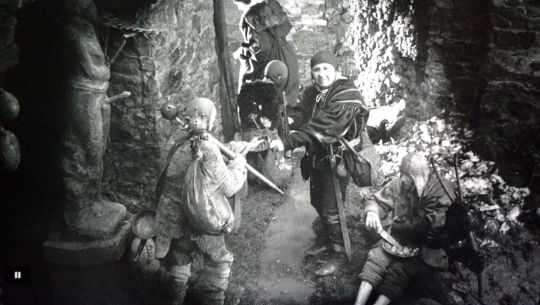
Meanwhile, back at the plot, things are not exactly as they seem; Don Rumata is actually Anton, one of a number of earthlings who have travelled to the planet to observe its retrograde ridiculousness. Apparently while it is the Middle Ages on the nameless planet, on earth it is centuries in the future. Exactly what the purpose of this exercise is beyond shameless Schadenfreude is unclear (a lot of things in Hard to be a God are unclear; I’ll swing back to that), particularly as Anton/Don Rumata is prohibited from direct intervention. Stuck in something which is not so much a society as a vortex of filth and degradation barely held in control by the venal rulers, the Don witnesses the various addled factions violently vying for control of what is essentially a planet sized toilet populated by cretins. Due to the fact that the Don is supposedly descended from a God (to explain his oddness; it’s not really clear) all the factions contest for his support, whether it be by force or the promise of change. All are found wanting and it’s clear that the populace is locked into a hopeless cycle of ignorance perpetuated by whoever claws their way to the top of the dung heap. Religion, politics and rebellion are all just mechanisms of, and the masks worn by oppression in the world of Hard to be a God (and our world; that bit is abundantly clear). As a God Don Rumata is condemned to watch, but as the atrocities exceed reason and the temptation to act grows, it becomes harder and harder for him to be a God.

This central dilemma may explain the oddity of the POV of the camera being acknowledged by the characters. At first you just pick up on the odd glance at the camera as someone disappears round a corner, but soon people are peering in/out right at you and you realise that in the background of scenes, beyond the narrative focus, there’s usually been some lollygagging halfwit eyeing you up. Precisely what this signifies is unclear. I reckon that it’s a device to put you in the same position as Don Rumata: you too are forced to witness the self-imposed degradation of a whole planet, but while you are unable to interfere he is only forbidden to do so. The obvious difference is the option to disobey is his, and by the time he (maybe) does so it should bring the viewer a form of empathetic climax. So maybe it’s a device playing into the movie’s concern with free will or maybe the actors are the most ill-disciplined bunch ever (“Stop looking in the camera, Yuri! It’s staying in! No, Oleg! No!”). I could be wrong, as I say it is unclear.

Yes, a lot of things in Hard to be a God are unclear. To be honest and in the interests of full disclosure, Hard to Be a God isn’t terribly concerned with delivering a coherent narrative; I wasn’t too sure what had actually happened within it after I had watched it, and had to piece it together in retrospect. So, you know, errors may have been made on my part. But it’s obviously a movie about the value of engaging your brain, so the fact it forces you to do so could well be built in. Yes, Hard to be a God is a gruelling, almost numbing experience made all the more gruelling and numbing due to its tenacious refusal to allow the plot to push entirely past the visual fiesta of faeces. But Hard to be a God is also a unique experience and that’s a pretty big achievement. Alas, Hard to be a God was also Aleksei German’s final achievement as he died the same year the movie premiered, 2013.

5 notes
·
View notes
Text
Hard to Be a God - Aleksei German (2013)
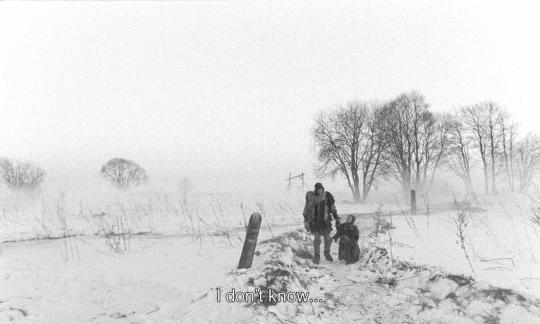
“Hard to Be a God ... is a 2013 Russian science fiction art film directed by Aleksei German, based on the 1964 novel of the same name by Arkady and Boris Strugatsky. A team of scientists travel to the planet Arkanar that is culturally and technologically centuries behind — progress is stuck way back in the Middle Ages. Anybody the inhabitants of the planet consider an intellectual is instantly executed. The scientists are ordered to not interfere and work undercover, but one of them, Rumata, wishes to stop the senseless murders of brilliant minds and is forced to at last pick a side. ...”
Wikipedia
Guardian: Hard to Be a God review – mud, blood and holy hell (Video)
Senses of Cinema
YouTube: Hard to be a God - Official Trailer, Don Rumata frees a slave who has been chained since he was 3, Don Rumata's heart is full of pity.
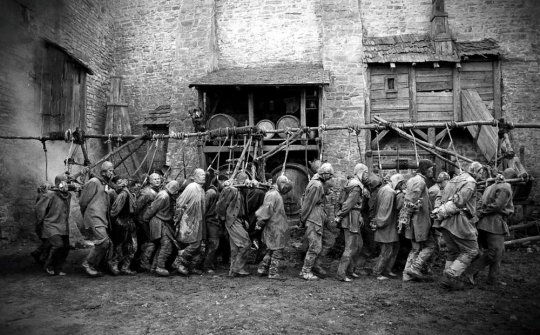
0 notes
Text
More comprehensive thoughts on Hard To Be A God will come when I’ve had some time to digest it and it isn’t 1:30 AM, but first off:
Don Rumata feels like a comically-overpowered DND character stuck in a brutal, unwinnable art-game RPG from the depths of itch.io
5 notes
·
View notes
Text
ARKADİ ve BORİS STRUGATSKİ // TANRI OLMAK ZOR İŞ
“..Ve öyle çok ki bunlar: karanlık, darmadağın olmuş, ezelden beridir emeklerinin nankörlüğü yüzünden nefret dolu, aşağılanmış, küçücük bir ideal için bile tefekkür etmeyi bilmeyen insanlar... Ve bunlara bir şeyler öğretmek, birlik haline getirmek, bir hedefe yöneltmek, kendilerinden kurtarmak da mümkün değil.” S.83
“..onurlu ve özgür insana dönüşecek bir tür hammadde, demir cevheriydiler. Tembel, açgözlü ve inanılmaz bencildiler. Psikolojik olarak nerdeyse hiçbirinin kölelerden farkı yoktu: inançlarının köleleri, kendilerine benzeyenlerin köleleri, ihtiraslarının köleleri, tamahkarlıklarının köleleri. Ve eğer bunlardan biri efendi olarak doğmuş veya daha sonra öyle olmuşsa, özgürlüğüyle ne yapacağını bilmezdi. Tekrar telaşla köleleşiyordu: zenginliğin kölesi, olağanüstü bir lüksün kölesi, sefahat düşkünü dostlarının kölesi, kölelerinin kölesi. Bunların büyük bir çoğunluğu da tamamen masumdu. Fazlasıyla atıl ve fazlasıyla cahildiler. Köleliklerinin kökleri tembellikte ve cehaletteydi; tembellik ve cehalet de yeniden ve yeniden köleliği doğuruyordu.” S. 145-146
“..Zavallı bir asiyim ben ve benim gibi biri her fırsattan yararlanmak zorundadır. Rahipler, tanrılar şimşeklerin efendisidir, derler.. Don Rumata, kale duvarlarını parçalamak için şimşeklere ihtiyacım var.
“Şimşeklerle ne yapmak istiyorsunuz?”
“Altın suyuna batırılmış alçakları tahtakuruları gibi yakacağım, sonuncusuna kadar, her birini on ikinci göbeğine kadar. Kalelerini yeryüzünden sileceğim. Ordularını, onları savunanları ve destekleyenleri yakacağım. Ama endişe etmeyin; şimşekleriniz sadece iyiliğe hizmet edecekler ve yeryüzünde sadece özgür köleler kalıp da dünyaya onlar hükmeder olunca, şimşeklerinizi size geri vereceğim, bir daha da istemeyeceğim.” S. 206-207
0 notes
Text
QUÉ DIFÍCIL ES SER UN DIOS
Del 1 de julio 2015
La novela homónima de ciencia ficción de los hermanos Strugatski, mismos autores que inspirarían a Tarkovski para la producción de Stalker (1979), relata los esmeros de Don Rumata, un viajero intergaláctico, por corregir e ilustrar a Arkanar, un planeta paralizado en la Edad Media sin capacidades evolutivas para un renacimiento.
Los habitantes del lugar toman como dios futurista a Don Rumata, quien verá sus esfuerzos fallar con la perpetua materialización de la miseria intelectual. El cineasta Aleksei German, quien no viviría para ver terminada la cinta, inmiscuye entre alegorías políticas y culturales sobre una sociedad alejada del progreso, y donde el enemigo no es el erudito sino el erudito que duda.
En tiempos de cine acelerado, de cine masivo que se toma un segundo entre planos antes de dar corte al consiguiente, por vez única podemos darle cabida (por más pequeña que ésta sea) a un realizador que, en relación a su exigencia creativa, le exige de igual manera suma inmersión a la audiencia. No es para menos. Después de que le tomara 15 años cocinar su obra póstuma, este director ruso nos ha entregado una expresión cinemática insuperable.
La sublimación de lo grotesco en la Edad Media a través de una película extraterrestre, que lo es no sólo por situarse en otro planeta sino también por su audacia cinematográfica que se reitera gracias a una estética enérgica, es dentro (y fuera) de los límites de la locura la representación máxima del periodo del oscurantismo que la historia del cine haya presenciado jamás.
0 notes